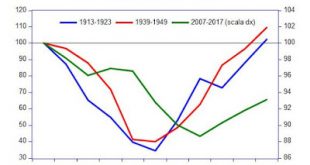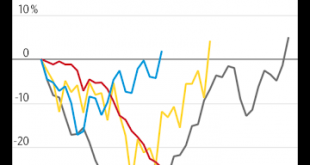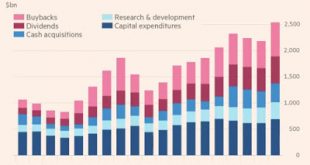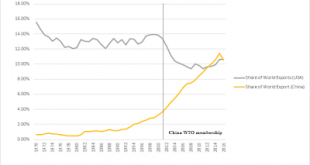A while ago I promised to return to this topic and discuss Mirowski's reply in the INET debate to my comment on his paper. And yes it's been quite a while since that debate. At any rate, I was at the Political Economy of World Systems (PEWS) conference last weekend, and we had some time to discuss Wallerstein (with him, I'm glad to say), his views on the structural crisis of capitalism. And someone (can recall who did) said something to the effect that the collapse of the economy in 2008...
Read More »On the Blogs — The Macro Edition
Did macroeconomics give up on explaining recent economic history?-- Simon Wren-Lewis on the Phillips Curve, the time varying NAIRU, Cowles metrics versus VARs and more. ROKE published a paper by him a while agoFiscal Rules: Make them Easy to Love and Hard to Cheat-- From the IMF blog, suggesting limits to spending, and to the size of fiscal deficits as in the European Union. It's more abut the rules really, but also a reminder of how much the IMF has changed... not! For a discussion on how...
Read More »The Italian crisis in historical perspective
In one graph. Source is this twitt from Gennaro Zezza. Real consumption per capita, not GDP (just making sure nobody gets confused). Note that while the crisis is considerably less profound (right axis for the current one), it is already going to be considerably more prolonged. Not sure what's worse really.
Read More »The Wall Street Journal and the future of Greece
Greece’s Business Prospects Brighten After Lost Decade. Or so says the Wall Street Journal. I fail to see how. And the graph below is their illustration. Note that the reason for the brighter situation is merely that it has stopped falling. I had a similar graph not long ago comparing it just with the Depression in the US.
Read More »On the blogs – Labor Theory of Value (LTV) Edition
Marx’s Refusal of the Labour Theory of Value-- David Harvey on Marx and the LTV Marx’s law of value: a debate between David Harvey and Michael Roberts-- Michael Roberts reply to the post above (Harvey's further response is also linked) Sraffa and Marxism or the Labor Theory of Value, what is it good for?-- old post by yours truly, which I offer (for now) in lieu of an actual post on the above debate, since I think there are problems with both views
Read More »Business Cycles in the Modern World System: Past, Present and Future
In case anybody is in the area around New York, the Program of the PEWS conference below. Thursday, April 26, 2018 -- 4:30 - 5:20 p.m. Reception in the DiMenna-Nyselius Library Room 107 C 5:20 p.m. Formal Opening of the Conference Library Multimedia Room Welcome: Eric Mielants (Sociology) Katsiaryna Salavei Bardos (Finance) Introduction of Keynote Speakers Dean Greenwald (CAS) Immanuel Wallerstein (Sociology, Yale University) “Cycles Within Structures versus Structural...
Read More »Corporate tax cuts use in one graph
So it seems that a good chunk of the GOP/Trump tax cuts will go to buybacks, and to fuel the bubble in the stock market, according to Robin Wigglesworth in the FT (subscription required). Bad news for those that think that higher earnings lead to higher investment (meaning gross formation of capital). My impression is that if you want tax cuts to be stimulative, you should target consumption, in particular for lower income groups, which tend to spend a higher proportion of their income.
Read More »On the Blogs—The Inequality Edition
Why So Few American Economists Are Studying Inequality—Alana Semuels at the Atlantic provides a nice summary of the problems in the profession, and cites the work by a few economists like Jamie Galbraith and the two cited below (Milanovic and DeLong)Chinese income distribution in 2002-3 and 2013—Branko Milanovic on how Chinese inequality, did not increase much in that period, even though it is high, and how it converged to the US levelsGlobalization: What Did Paul Krugman Miss?—Brad...
Read More »More on China and the US
So, if there is a reason for concern regarding China in the US, it is definitely the use of their developmental state to promote technological innovation. And as the graph shows they are catching up on spending, at least. I'm not sure I agree with the WSJ here, but they are certainly moving into high tech areas like AI.
Read More »China and US Trade Tensions in one graph
The graph below illustrates the reasons for the concerns in the US and the somewhat erratic, but more combative position of the Trump administration. Note, also, that China is closing the gap on R&D spending and on the technological front, at a faster pace that I would have predicted (more on that for a later post).
Read More » Naked Keynesianism
Naked Keynesianism








